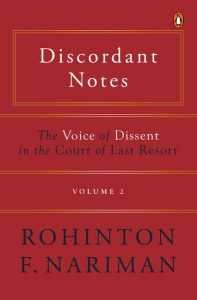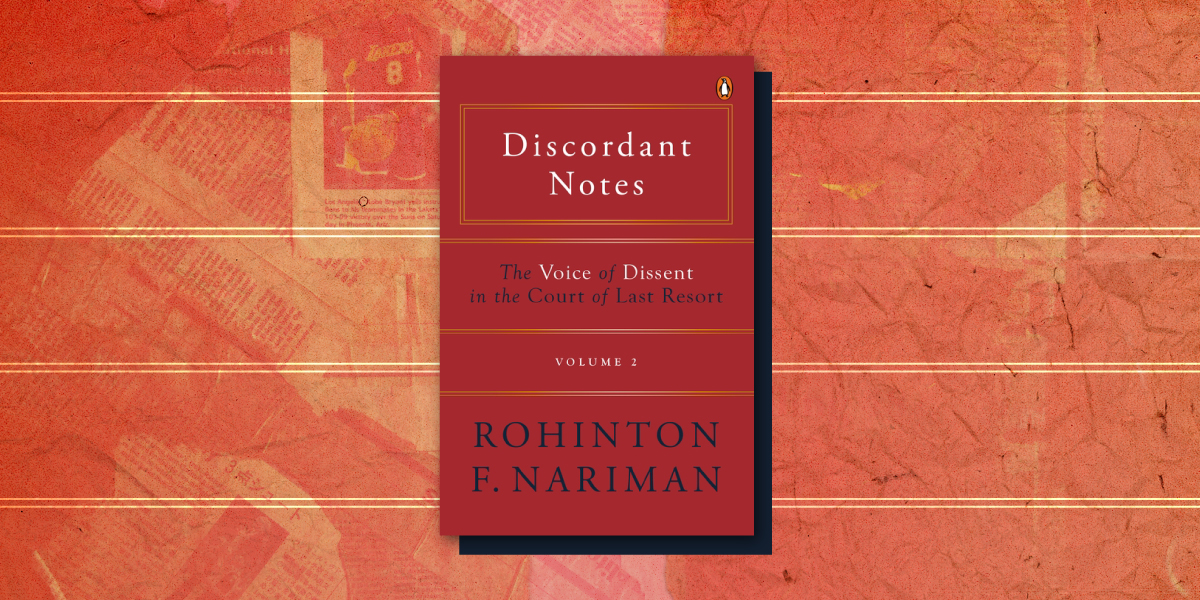In the second volume of his landmark book, Discordant Notes, Rohinton Nariman brings to light ground-breaking cases and judgements which made remarkable additions to our Constitution, improved and improvised some laws and most importantly, gave the space to the citizens of this country to be able to think, re-think and re-learn freely.
Charting out the history of the dissenting judgements in the history of the Supreme Court of India, Nariman begins by quoting Professor Allan Hutchinson’s Laughing at the Gods: Great Judges and How They Made the Common Law, where he speaks of ‘judicial greatness’ as:
‘Great judges seek to make a critical accommodation with the legal tradition by combining heresy and heritage in a playful judicial style; they refuse to be hampered by customary habits of judicial mind. For them, law is not something to be mastered. It is a sprawling tableau of transformation in which experimentation and improvisation are valued as much as predictability and faithfulness to existing rules and ideas. They see possibilities and make moves that others overlook. Great judges flaunt conventional standards in the process of remaking them; their judgements are the exceptions that prove the rule. And, once they have done what they do, others are less able to view the world in the same way again.’

He then mentions that it is in this sense that he chose the four great dissenters for this book. Overlooking other prominent judges who wrote numerous dissents in their lifetime, he chose to write about the ones who might have given only six dissents, for example, but had brilliant oversight packed in them, insights that changed the course of future judgements in India.
Nariman named these four dissenters, the ‘Four Horsemen of the Apocalypse’ because just like in Book Six, ‘Revelation’ of the New Testament in the Bible, these are the people who give the world a chance to repent before they are consigned to the ashes. He states how each one of these four dissenters fulfills this role, some of them prophesying doom if their dissents do not become the law, and others offering a chance of redemption, if in the future, their view is accepted in preference to that of majority.
One of the first cases discussed in the second volume of Discordant Notes is the Keshava Madhava Menon v. State of Bombay (1951) case dissented by judge Sir Saiyid Fazl Ali. What came up for consideration before the Supreme Court was the interpretation of the expression ‘void’ contained in Article 13 (1) of the Constitution of India. The majority judgement, delivered by S.R. Das, J., on behalf of the three learned judges of the court, held that Article 13 (1) does not make existing laws which are inconsistent with fundamental rights void ab initio, but only renders such laws ineffectual with respect to the exercise of fundamental rights on and after the date of commencement of the Constitution, Article 13 (1) having no retrospective effect. Therefore, if prosecution for a criminal act was commenced before the Constitution came into force, it can be proceeded with according to that law, even after the commencement of the Constitution.
Fazl Ali, J., joined Mukherjea, J., dissented. For reference, Article 13 (1) reads as follows:
‘All laws in force in the territory of India immediately before the commencement of this Constitution, in so far as they are inconsistent with the provisions of this Part, shall, to the extent of such inconsistency, be void.’
Fazl Ali, J referred to the original draft of the Constitution, in which the words ‘shall stand abrogated’ were used instead of ‘shall be void’ in Article 13 (1). He then observed that the Constitution makers used various expressions to convey precisely and thoroughly what they meant. While some articles used ‘invalid’, ‘ceased to have effect’ and ‘shall be inoperative’, ‘void’ is used only in two articles 13 (1) and 154 – and both of them deal with cases where laws are repugnant to other laws. Hence, the learned judge concluded that there is a precision and thoroughness of the framers of the Constitution with the strong sense in which the word ‘void’ has been used and cannot be completely ignored.
Nariman noted that this case is an important judgment, which was later followed in Behram Khurshid Pesikaka v. State of Bombay (1955) and Bhikaji Narain Dhakras v. State of M.P. (1955), as forming the foundation for what became known as the ‘Doctrine of Eclipse’, i.e. that pre-constitutional law cannot be said to be void from inception, but only ineffective if it violates a fundamental right, the fundamental right casting a shadow over such law.
Rohinton Nariman discusses and analyses many more such interesting cases and judgements and enlightens us with the kind of roads they fractured, mended and laid the foundation of, in this remarkable book. It speaks to anyone who decides to speak for themselves or for others, who decides to obtain knowledge in multi-dimensional spheres and most notably, for someone who decides to learn and re-learn.









